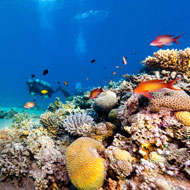
Select Committee inquiry to examine what has been learned
An inquiry into ocean acidification and its effects has been launched by Parliament’s Science and Technology Committee.
The Ocean Acidification Inquiry aims to address issues arising from the NERC Ocean Acidification Programme, which noted the importance of tackling increasing ocean acidification.
The inquiry has also been launched in response to one of the key targets identified by the United Nations Sustainable Development Goal 14, which was to ‘minimise and address the impact of ocean acidification’.
The inquiry is calling for submissions in the following areas until 25, January 2017:
• The role of increased CO2 emissions, and any other drivers or feedback mechanisms, on ocean acidification.
• Whether ocean acidification and its impact varies regionally.
• The main socio-economic, industry, ecosystem and environmental impacts of ocean acidification.
• The level of understanding of the processes and impacts of ocean acidification. The gaps in terms of monitoring, prevention, mitigation, and adaptation.The impact of previous UK research work, and the sufficiency of research currently underway.
• What areas of Government policy-making are currently held back by insufficient knowledge/evidence on ocean acidification, and the risks this poses.
• What policy interventions are needed to tackle ocean acidification—in terms of both the known science and the uncertainties—and what the barriers are to implementation.
Stephen Metcalfe MP, chair of the Science and Technology Committee, commented: "About seventy per cent of the Earth’s surface is covered by oceans but our scientific understanding of the marine environment is patchy at best.
"Now that the UK's five year Ocean Acidification Research Programme has ended, we are launching the first parliamentary inquiry on this concerning topic to examine what has been learned and make recommendations to Government.
“Should we be worried about the consequences of ocean acidification for the food chain and the marine economy? How bad is the problem? And what policy interventions should the Government be bringing forward to tackle it? These are all questions that we will address in this inquiry."
Submissions can be sent via the Ocean Acidification Inquiry page. The closing date for submissions is Wednesday, 25 January 2017.



 The BSAVA has opened submissions for the BSAVA Clinical Research Abstracts 2026.
The BSAVA has opened submissions for the BSAVA Clinical Research Abstracts 2026.